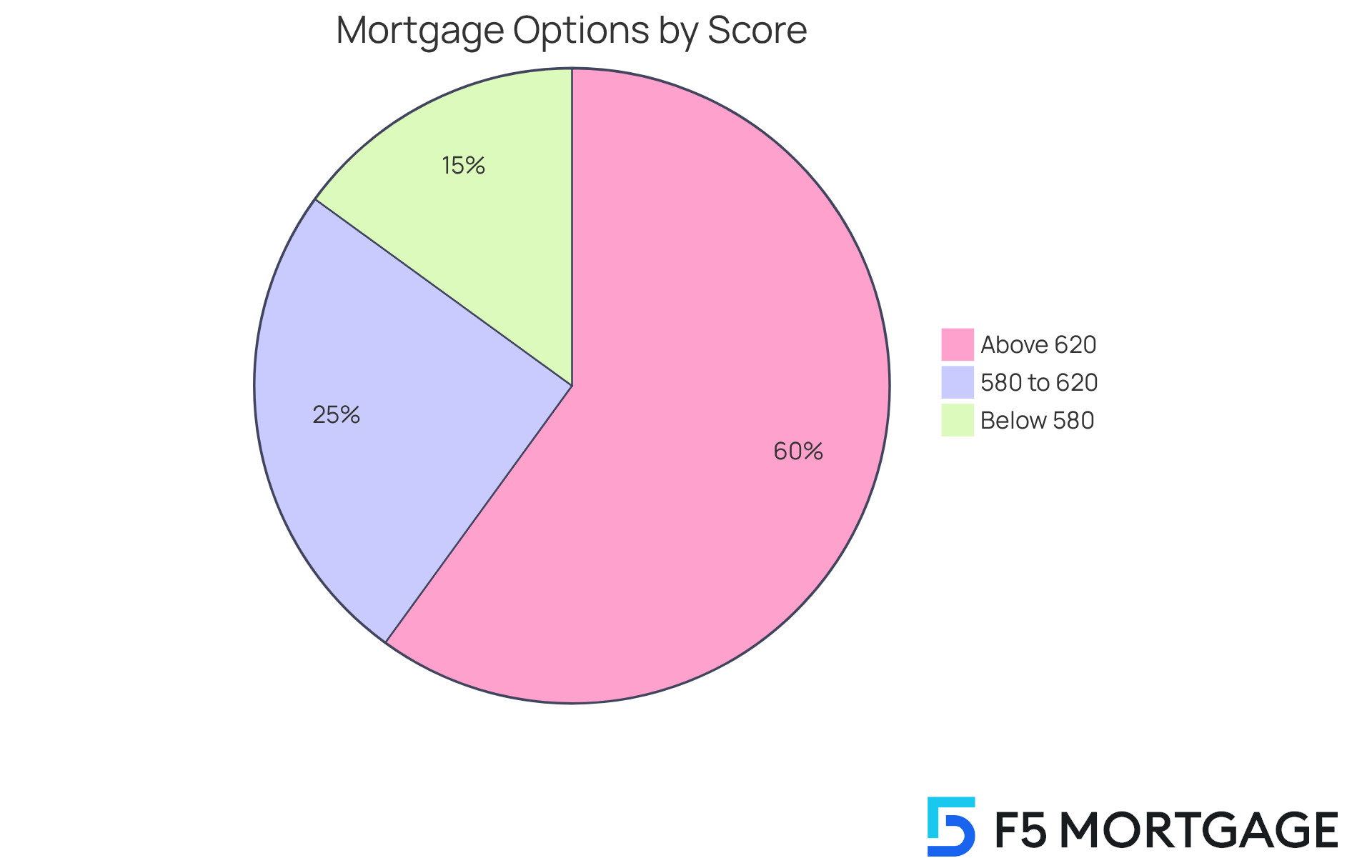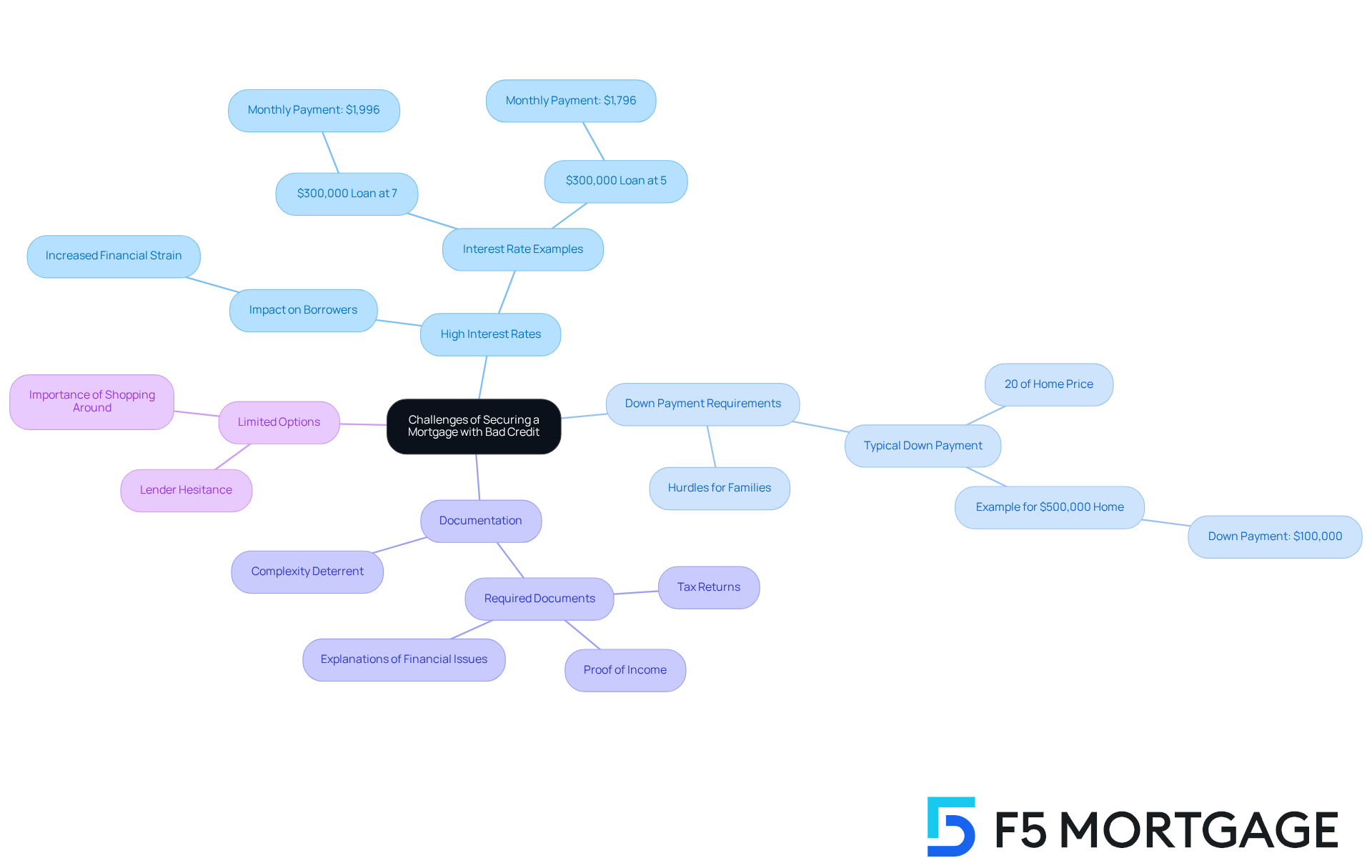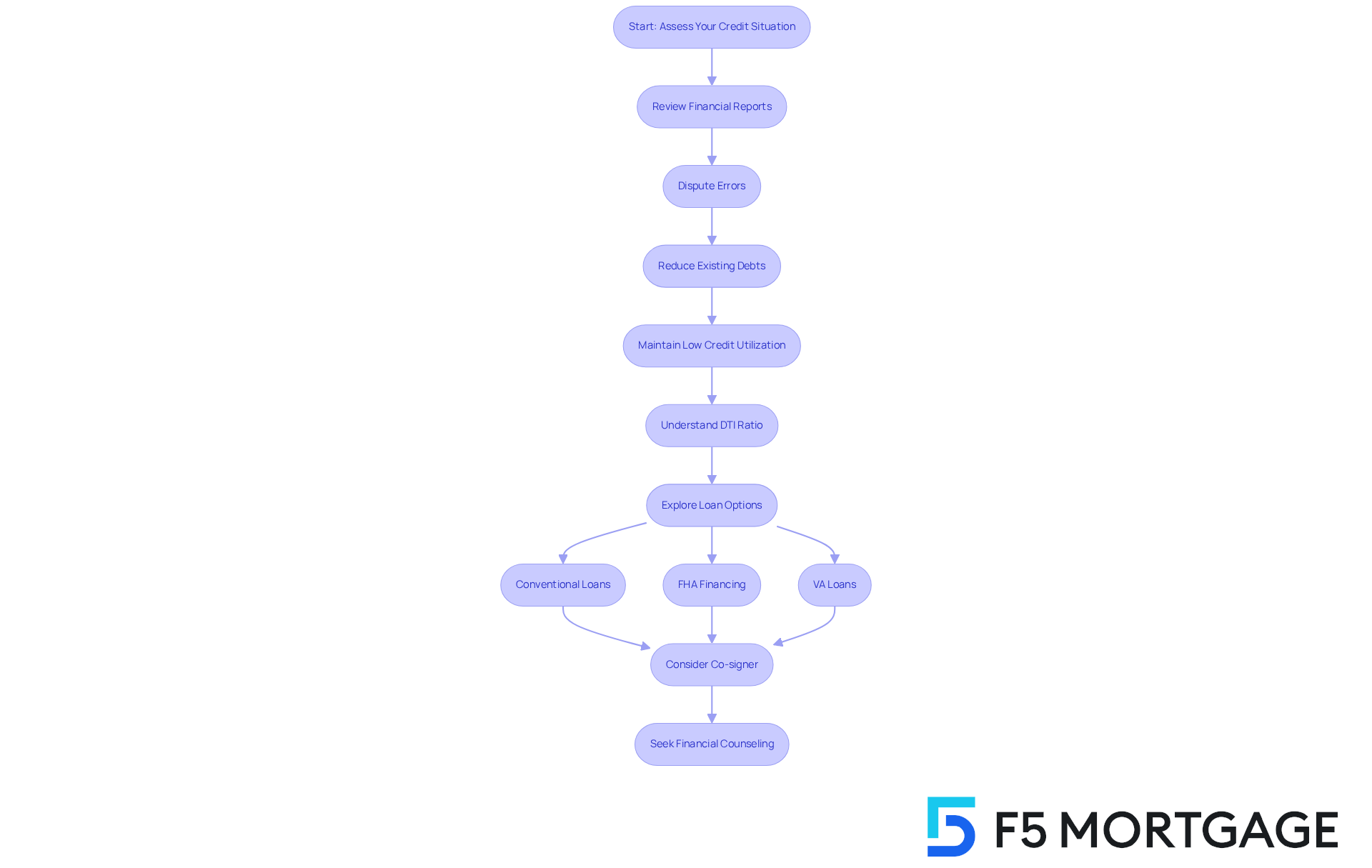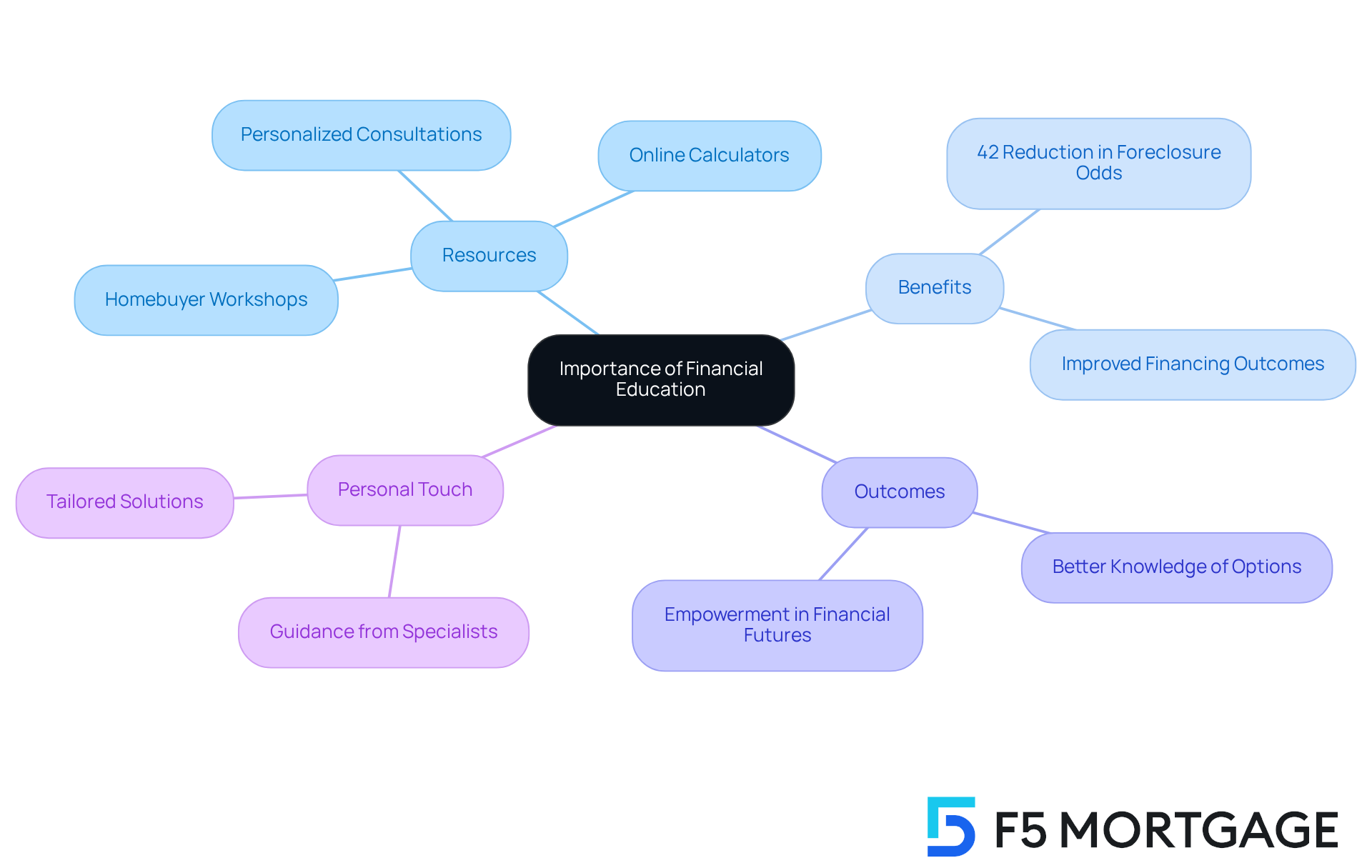Overview
If you’re facing the challenge of bad credit, you may wonder if obtaining a mortgage is still possible. The good news is that it is indeed achievable, although it might come with higher interest rates and less favorable terms compared to those with better credit scores. We understand how daunting this can feel.
Many traditional loans typically require a minimum credit score of 620. However, there are options available that may offer you hope. For instance, government-backed loans like FHA loans can accept scores as low as 580. It’s important to be aware, though, that these options may involve increased costs and stricter conditions.
We’re here to support you every step of the way as you navigate this process. Understanding your options can empower you to make informed decisions that best suit your situation.
Introduction
Navigating the path to homeownership can feel overwhelming, especially for those facing the challenges of bad credit, which is defined as a FICO score below 580. We understand how daunting this can be. This financial hurdle raises important questions about eligibility and complicates the mortgage landscape, where traditional lenders often impose strict requirements and higher interest rates. However, there is hope. By understanding the available options and strategies, prospective buyers can find ways to overcome these obstacles.
What steps can you take to secure a mortgage despite your credit history? How can you improve your chances of approval? We’re here to support you every step of the way, guiding you through this process with empathy and understanding.
Defining Bad Credit and Its Impact on Mortgage Eligibility
Poor ratings, defined as a score below 580 according to the FICO assessment model, can feel overwhelming. This rating often reflects a history of missed payments, high credit utilization, or other financial missteps. We understand how concerning this can be, especially when lenders view bad credit as a significant risk factor, leading many to wonder, can you get a mortgage with bad credit? Most traditional mortgages require a minimum score of 620, while government-supported options, like FHA programs, may accept scores as low as 580. Recognizing this distinction is crucial for prospective homebuyers, as it directly impacts the types of financing available and the interest rates you may receive.
For those with scores under 580, the question of can you get a mortgage with bad credit makes the path to homeownership more challenging. Higher interest rates and less favorable financing conditions often accompany lower ratings, leading many to wonder, can you get a mortgage with bad credit, which makes it harder to achieve your dream of owning a home. In fact, borrowers in this range may face loan rates that are significantly higher than those offered to individuals with better financial histories. Over time, a lower rating can increase the total cost of borrowing by thousands of dollars.
Real-life case studies illustrate the importance of financial ratings on mortgage approval. For instance, a borrower with a score of 580 may qualify for an FHA loan but will likely encounter higher premiums and stricter terms compared to someone with a score of 700, who could secure more favorable rates and conditions. This disparity underscores the importance of maintaining a strong financial rating, as it directly influences whether you can get a mortgage with bad credit and impacts the overall affordability of homeownership.
Experts emphasize that understanding your financial rating is vital in navigating the loan landscape. As one expert noted, ‘Your rating plays an essential role in your home purchasing experience.’ Therefore, it’s essential for prospective buyers to actively review their financial reports and take steps to improve their ratings. Doing so can significantly enhance their loan options and terms, empowering them on their journey to homeownership.

Challenges of Securing a Mortgage with Bad Credit
It can feel daunting to think about how can you get a mortgage with bad credit. We understand how challenging this can be, especially when considering if you can get a mortgage with bad credit, given the increased interest rates that lenders impose to mitigate perceived risks. For borrowers with scores below 620, interest rates often rise considerably, frequently exceeding 7%. This can lead to significantly higher monthly payments. For instance, an individual with a $300,000 loan at a 7% interest rate could face monthly payments of around $1,996, compared to $1,796 at a 5% rate. This illustrates the financial strain that a negative borrowing history can impose.
Additionally, down payment requirements for these loans can be steep, often exceeding 20% of the home’s purchase price. For a home priced at $500,000, a borrower might need to provide a down payment of $100,000 or more. This can be a significant hurdle for many families.
The documentation required for obtaining a mortgage with poor financial history can also be overwhelming. We know that lenders often demand comprehensive documentation to assess your financial condition, including:
- Proof of income
- Tax returns
- Detailed explanations of any previous financial issues
This complexity can deter potential borrowers from pursuing their homeownership dreams.
Moreover, individuals often ask, can you get a mortgage with bad credit, as options for those with poor financial history are frequently limited, with many lenders hesitant to work with high-risk borrowers. This makes it essential for those seeking a mortgage to shop around and compare offers from various lenders to find the most favorable terms.
Expert insights reveal that while the obstacles are significant, there are still pathways to homeownership for individuals facing these challenges. Financial consultants suggest focusing on gradually improving your credit scores and exploring specialized loan options designed for those with suboptimal financial histories. By understanding the landscape and taking proactive steps, you can navigate the complexities of obtaining financing, even in the face of financial difficulties.

Strategies for Overcoming Bad Credit in Mortgage Applications
Navigating the mortgage application process can feel overwhelming, particularly if you’re asking yourself, can you get a mortgage with bad credit? We know how difficult this can be, but a proactive strategy can make a difference. Start by carefully reviewing your financial reports for any errors. It’s surprising to learn that over one-third of Americans have outdated or incorrect information that can negatively impact their scores. Disputing these errors is crucial; lenders can assist you in this process, potentially leading to significant improvements in your creditworthiness.
Additionally, focusing on reducing existing debts and keeping credit card balances below 30% of your available limits can enhance your credit utilization ratios, which are key factors in credit scoring. Understanding your Debt-to-Income (DTI) ratio is also essential. A maximum DTI ratio of 43% is generally necessary for home loans, whether you’re obtaining a conventional loan or refinancing an existing one. Improving your DTI can lead to more competitive loan rates, which is especially important for families looking to enhance their homes.
For those considering refinancing, Colorado offers various options:
-
Conventional Loans: These traditional loans provided by private lenders typically require a strong financial rating and a low DTI. The best mortgage rates are available to individuals with a minimum of 740 on their FICO.
-
FHA Financing: Supported by the government, FHA financing options are more accessible for homeowners with lower credit scores, usually requiring a minimum credit score of 580. DTI requirements are also less stringent with FHA financing.
-
VA Loans: Available through the Veterans Administration, VA loans are designed for military members and their spouses. They often come with excellent loan rates and a straightforward application process, with specific eligibility criteria that F5 Mortgage can help you review.
Using a co-signer with a strong financial background can greatly enhance your chances of mortgage approval. Statistics show that applications with co-signers frequently experience higher approval rates, as the co-signer’s creditworthiness can compensate for the primary borrower’s lower rating. If you’re facing challenges, you might wonder, can you get a mortgage with bad credit? Government-supported loans like FHA or VA loans offer more flexible qualification standards, making them feasible options for individuals with poor financial histories.
Participating in financial counseling can also provide personalized strategies to improve your scores over time. This personalized guidance empowers potential homeowners to take actionable steps toward achieving their homeownership goals, ultimately making the dream of owning a home more attainable. Remember, we’re here to support you every step of the way.

The Importance of Financial Education and Support
Financial education is essential for navigating the loan environment, particularly for those who wonder, can you get a mortgage with bad credit? We understand how daunting this can be, which is why resources like homebuyer workshops, online calculators, and personalized consultations are available to provide crucial insights into financing options and effective budgeting strategies. For instance, homebuyer education courses, such as those required by the Tennessee Housing Development Agency (THDA), have demonstrated a remarkable 42% reduction in foreclosure odds, highlighting their role in fostering responsible homeownership.
At F5 Mortgage, we are dedicated to offering a variety of comprehensive guides and tools to help clients assess their financial situations and identify suitable loan programs, including down payment assistance options. Our caring team, including specialists like Alyssa Alberton, focuses on guiding clients through the financing process with a personal touch. We believe that everyone, regardless of their financial background, deserves tailored solutions that meet their unique needs. These workshops not only educate participants about their options but also empower them to take control of their financial futures. Real-life stories show that those who engage in these workshops, particularly participants of the THDA homebuyer education course, often achieve better financing outcomes, gaining the knowledge necessary to navigate the complexities of funding.
Quotes from financial educators reinforce the significance of these resources:
“Financial freedom is available to those who learn about it and work for it.”
This statement emphasizes the proactive mindset needed to tackle credit challenges. Additionally, the STEP IN initiative provides discounts for employees of participating corporations for the online Homebuyer Education course, enhancing accessibility. By equipping themselves with knowledge and utilizing available resources, potential homebuyers can explore whether they can get a mortgage with bad credit, leading to improved mortgage outcomes and a smoother home-buying experience.

Conclusion
Navigating the path to homeownership can feel overwhelming, especially for those grappling with bad credit. However, it’s essential to recognize that options are available. This article sheds light on the hurdles faced by individuals with credit scores below 580, illustrating how these scores can significantly affect mortgage eligibility and interest rates. Understanding the implications of your credit score is vital for making informed decisions about financing options.
While traditional mortgages often require a minimum credit score of 620, there are more accessible pathways for those with lower scores through government-supported loans like FHA and VA loans. The financial strain of higher interest rates and hefty down payment requirements adds to the complexity of the journey to homeownership. Yet, there are proactive strategies that can help:
- Improving credit scores
- Exploring specialized loan options
- Seeking resources like financial counseling
These can empower you to overcome these challenges.
Ultimately, securing a mortgage with bad credit is not an impossible feat. By educating yourself about your financial options and actively working to enhance your creditworthiness, you can take significant steps toward achieving your dream of homeownership. Engaging with available resources and support systems is crucial; informed borrowers are better equipped to navigate the complexities of the mortgage landscape and secure favorable financing terms. Remember, we know how challenging this can be, and we’re here to support you every step of the way.
Frequently Asked Questions
What is considered bad credit according to the FICO assessment model?
Bad credit is defined as a score below 580 according to the FICO assessment model.
What are common reasons for having a bad credit score?
Common reasons for a bad credit score include a history of missed payments, high credit utilization, or other financial missteps.
Can you get a mortgage with bad credit?
Yes, you can get a mortgage with bad credit, but it may be more challenging. Most traditional mortgages require a minimum score of 620, while government-supported options, like FHA programs, may accept scores as low as 580.
How does bad credit impact mortgage eligibility?
Bad credit can lead to higher interest rates and less favorable financing conditions, making it harder to achieve homeownership. Borrowers with lower ratings may face significantly higher loan rates compared to those with better credit histories.
What are the potential costs associated with having a bad credit score when borrowing?
A lower credit rating can increase the total cost of borrowing by thousands of dollars over time due to higher interest rates and less favorable loan terms.
How do credit scores affect the terms of a mortgage?
For example, a borrower with a score of 580 may qualify for an FHA loan but will likely face higher premiums and stricter terms compared to someone with a score of 700, who could secure more favorable rates and conditions.
Why is it important to understand your financial rating when seeking a mortgage?
Understanding your financial rating is vital because it plays an essential role in the home purchasing experience, influencing loan options and terms available to you.
What steps can prospective homebuyers take to improve their credit ratings?
Prospective homebuyers should actively review their financial reports and take steps to improve their ratings, which can significantly enhance their loan options and terms.








